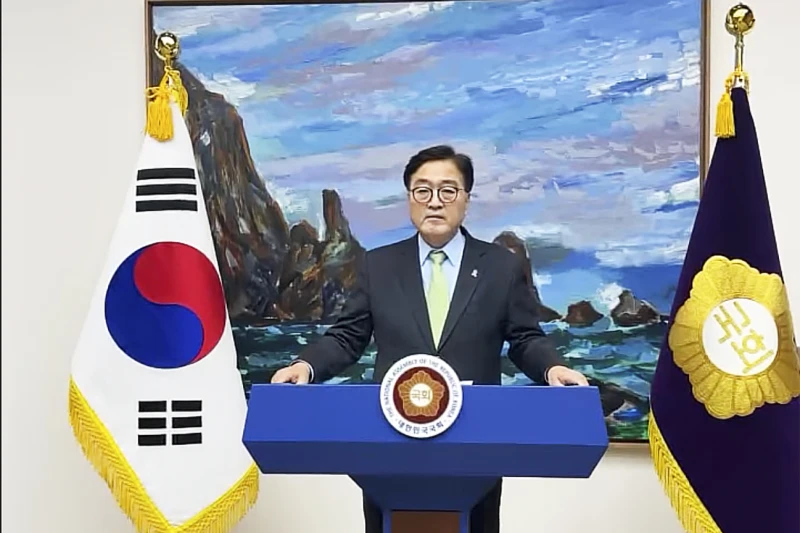SEOUL, South Korea :
In a dramatic turn of events that shocked South Korea, President Yoon Suk Yeol imposed martial law late Tuesday, only to revoke it early Wednesday under mounting political and public pressure. The declaration, which lasted a mere six hours, has plunged the nation into political turmoil and raised questions about the president’s leadership and the future of South Korean democracy.

Martial Law Imposed Amid Rising Tensions
President Yoon’s controversial decision to impose martial law came late Tuesday night, citing the need to eliminate “anti-state forces” and restore order amidst a deepening impasse with an opposition-controlled parliament. The declaration allowed for the suspension of political gatherings, restrictions on freedom of the press, and the deployment of troops to enforce order, harking back to South Korea’s authoritarian past—a period the nation has not revisited since its democratization in 1987.
According to Yoon, the opposition’s alleged sympathies with communist North Korea and their attempts to impeach key government officials were paralyzing the state’s functioning. In his televised speech, he claimed the martial law was necessary to “protect the constitutional democratic order” and “eradicate pro-North Korean forces.” However, his bold move was immediately met with bipartisan opposition.
Swift Political Action
The National Assembly, led by opposition Speaker Woo Won Shik, wasted no time in challenging Yoon’s declaration. Lawmakers from both opposition and conservative parties gathered in an emergency session and voted unanimously to nullify martial law. Woo declared the action “invalid,” emphasizing the Assembly’s commitment to safeguarding democracy in South Korea.
Following the vote, troops stationed around the National Assembly began to withdraw, signaling an end to the standoff. By 4:30 a.m. Wednesday, martial law was formally lifted during a hastily convened Cabinet meeting.
“The citizens of South Korea have observed the maturity of our military in today’s events,” Woo remarked, commending the swift exit of troops without further escalating tensions.
Military Presence and Public Backlash
While martial law was in effect, scenes of police officers blocking the National Assembly’s entrance and soldiers carrying rifles on its premises alarmed the public. Helicopters were seen landing inside the Assembly grounds, sparking further outrage.
Protesters quickly mobilized, gathering outside the parliament and demanding Yoon’s resignation. Waving banners and chanting slogans, they denounced the imposition of martial law as a regression to the military-led authoritarian regimes of the past. Although scuffles broke out between protesters and troops, no major injuries or damages were reported.
One protester, a woman attempting to grab a soldier’s rifle, shouted, “Aren’t you embarrassed?”—a sentiment echoed across the nation.
Constitutional Questions and International Concern
South Korea’s constitution permits the declaration of martial law only during wartime, a comparable national emergency, or situations necessitating military intervention. Critics argue that the current circumstances, primarily political gridlock, did not meet these criteria.
The move also drew international scrutiny. The White House expressed “serious concern,” with a spokesperson for the U.S. National Security Council stating that Washington had not been notified in advance. The Pentagon, however, confirmed no immediate impact on the 27,000 U.S. service members stationed in South Korea.
Opposition and Political Fallout
The opposition Democratic Party, led by Lee Jae-myung, condemned Yoon’s actions as unconstitutional. Lee, who narrowly lost to Yoon in the 2022 presidential election, described the move as “illegal” and called for the president’s immediate resignation. Yoon’s conservative People Power Party also criticized the decision, with its leader Han Dong-hoon labeling it “wrong.”
Adding to the controversy, Democratic lawmakers alleged that surveillance footage suggested troops were attempting to arrest key political figures, including Lee, Woo, and even Han. The Defense Ministry and Yoon’s office declined to comment on these claims.
A Return to Authoritarian Tactics?
Yoon’s imposition of martial law has drawn comparisons to South Korea’s authoritarian era, particularly the military coups and crackdowns of the 1970s and 1980s. The last declaration of martial law in the country occurred in 1979, following the assassination of then-President Park Chung-hee.
Political analysts have criticized Yoon’s move as a significant step backward for South Korean democracy. Natalia Slavney, a research analyst at the Stimson Center’s 38 North project, described the declaration as part of a “worrying trend of abuse” since Yoon took office.
“South Korea has a robust history of political pluralism and is no stranger to mass protests and swift impeachments,” Slavney noted, referencing the impeachment of former President Park Geun-hye in 2017.
Sydney Seiler, Korean chair at the Center for Strategic and International Studies, likened Yoon’s actions to a desperate gambit, saying the president had “nothing to lose” as he faced the likelihood of impeachment even before declaring martial law.
Struggling Approval and Mounting Pressure
Since taking office in 2022, Yoon has struggled with low approval ratings and mounting opposition. His hardline stance on North Korea and allegations of corruption involving his administration have further alienated voters.
The president has also been embroiled in clashes with the opposition over next year’s budget and efforts to impeach three top prosecutors. Meanwhile, ongoing strikes by thousands of doctors over government healthcare reforms have added to the administration’s challenges.
What’s Next for South Korea?
As South Korea grapples with the aftermath of this political crisis, Yoon faces an uncertain future. Calls for his impeachment have intensified, with protesters and lawmakers alike accusing him of undermining democratic principles.
Despite lifting martial law, Yoon continues to blame the opposition for what he describes as “unscrupulous acts” that threaten the state’s stability. However, his critics argue that his actions have done more to destabilize the nation than the opposition’s political maneuvers.
The coming days will determine whether Yoon can weather the storm or if this unprecedented move will lead to his removal from office. One thing is certain: South Korea’s commitment to democracy will once again be put to the test.
Pingback: Earthquake in Hyderabad: Tremors Felt Across Telangana as 5.3-Magnitude Quake Strikes Mulugu - The Info Platform
Pingback: "Devendra Fadnavis: From Nagpur to Maharashtra's Visionary Leader and 19th Chief Minister" - The Info Platform